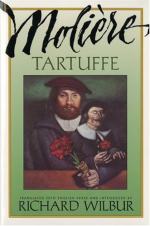|
This section contains 3,523 words (approx. 12 pages at 300 words per page) |

|
SOURCE: “Dramatic Justice in Tartuffe,” in Modern Language Notes, Vol. 90, No. 4, April, 1975, pp. 583-90.
In the following essay, Zwillenberg explores Molière's use of justice in Tartuffe.
Few will quarrel with the judgment that Molière's Tartuffe is a masterpiece, yet those who agree on the excellence of the play frequently express hostility and confusion about the intervention of the King at the end. The King's justice, it is argued, may be thorough and effective, but it is so unexpected as to cast doubt upon the dramatic coherence of the entire comedy. Probably, Molière himself is responsible for this reaction, having resorted to a deus ex machina that appears to defy internal resolution. By relying on a device which introduces a new character possessed of sweeping powers, he seems to be saying that there is a break between dramatically motivated expectations of justice and the King's own...
|
This section contains 3,523 words (approx. 12 pages at 300 words per page) |

|


